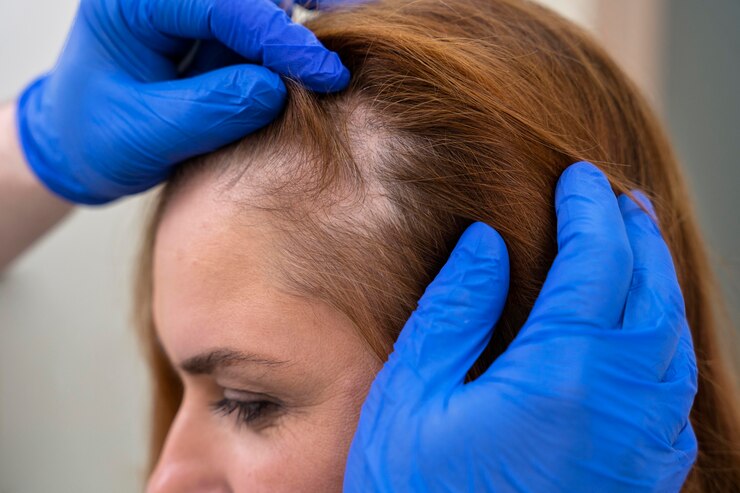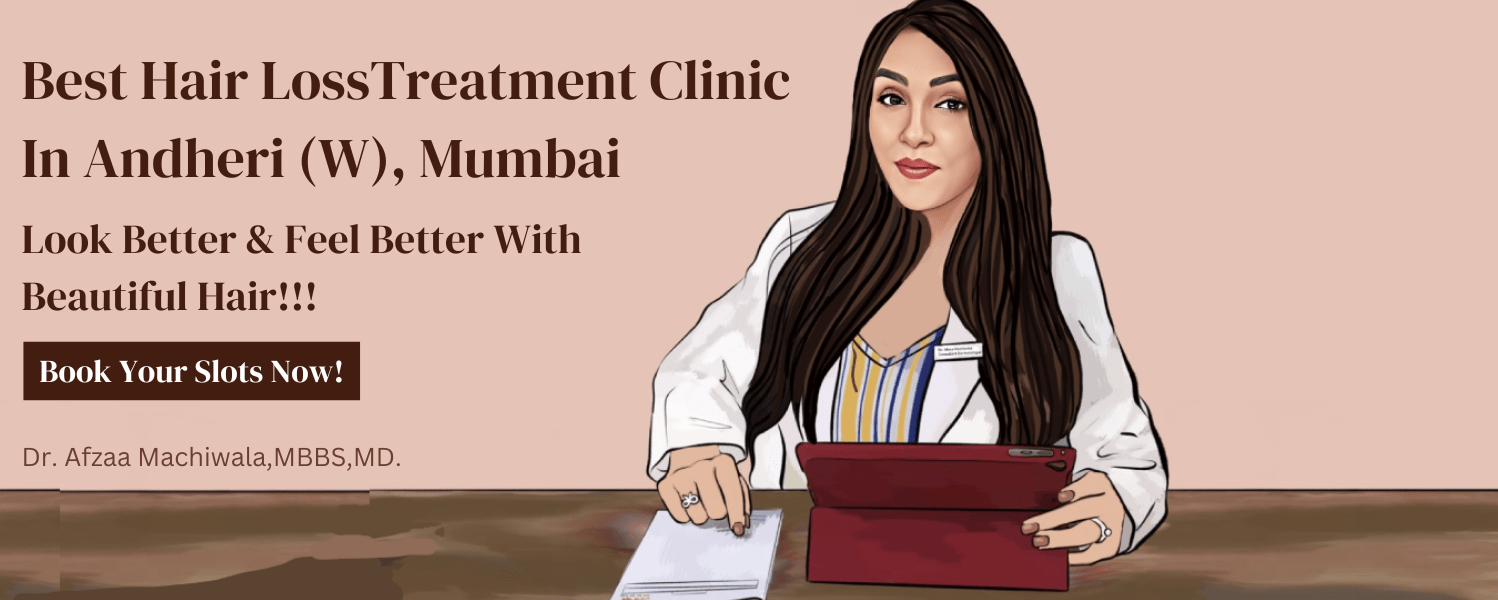We Provide The Best Hair Transplant & Hair Loss Treatment In Andheri(W), Mumbai, Book Your Online Appointment Today!
HOW TO GET STARTED
Just Follow These
Fill contact details
Select date and time
Tell us your concerns
Complete the payment
Appointment confirmed
Answer the questions before pay
OUR TREATMENTS
Hair Loss Treatment in Andheri (W), Mumbai

- There are many hair treatment centers and hair loss & transplant clinics in Mumbai, but Sutvakclinic is the best place in Andheri(W).
- It uses advanced techniques with a lot of years of experience. Our clinic is staffed with qualified and skilled doctors specializing in hair loss and transplant services.
- Throughout our years of operation, we have consistently focused on delivering top-quality services to our clients. Our expertise is effectively addressing hair loss, scalp issues, and other hair-related problems, prioritizing client satisfaction.
Contact Us

Get expert advice for all your skin/hair concerns!
Provide your information & we will call you back
What Are The Causes Of Hair Loss?
Hair loss, also known as alopecia, can be caused by a variety of factors. Some of the main causes include:-
1. Genetic Factors
The most common cause of hair loss is a hereditary condition called male & Female pattern baldness. It usually occurs gradually with aging and in predictable patterns — a receding hairline and bald spots in men and thinning hair along the crown of the scalp in women.2. Hormonal Changes and Medical Conditions
A variety of conditions can cause permanent or temporary hair loss, including hormonal changes due to pregnancy, childbirth, menopause, and thyroid problems. Medical conditions include alopecia areata (which causes patchy hair loss), scalp infections like ringworm, and trichotillomania (a hair-pulling disorder).3. Medications and Supplements
Hair loss can be a side effect of certain drugs, such as those used for cancer, arthritis, depression, heart problems, gout, and high blood pressure.4. Radiation Therapy to the Head
The hair may not grow back the same as it was before.5. A Very Stressful Event
Many people experience a general thinning of hair several months after a physical or emotional shock. This type of hair loss is temporary.6. Certain Hairstyles and Treatments
Excessive hairstyling or hairstyles that pull your hair tight, such as pigtails or cornrows, can cause a type of hair loss called traction alopecia. Hot oil hair treatments and permanents can cause inflammation of hair follicles that leads to hair loss. If scarring occurs, hair loss could be permanent.7. Poor Nutrition
Lack of proper nutrition can also contribute to hair loss. Deficiencies in nutrients like protein, iron, and other vitamins and minerals, which are crucial for hair growth, can lead to thinning of hair or hair loss.
Why Choose Us?

Highly Experienced Doctor

200+ Satisfied Clients

Advanced Technology

Affordable Rates
What Are The Benefits Of Hair Loss Treatments?
Improved Hair Growth
Many treatments aim to stimulate hair growth or slow hair loss. For instance, treatments like minoxidil (Rogaine) and finasteride (Propecia) are proven to promote hair regrowth and slow down balding.
Increased Confidence & Self-Esteem
Hair loss can significantly affect self-esteem and confidence. Effective treatments can restore not just hair, but also a person’s positive self-image and confidence.
Prevention of Further Hair Loss
Some treatments are effective in stopping or slowing down the progression of hair loss. This is particularly beneficial in cases of hereditary baldness or pattern baldness.
Improved Scalp Health
Certain treatments, especially those that involve scalp care and nutrition, can improve overall scalp health. A healthy scalp is essential for healthy hair growth.
Natural Appearance
Hair transplantation and some other procedures offer a more natural look compared to wigs or hairpieces.
Psychological Benefits
Dealing with hair loss can be stressful and lead to anxiety or depression. Successful treatment can alleviate these psychological stresses.
Customizable Options
There are various treatments available, allowing individuals to choose one that best suits their situation, lifestyle, and budget. Options range from topical treatments and medications to surgical procedures like hair transplants.
Reduction of Inflammation & Scalp Conditions
Treatments targeting underlying scalp conditions (like dermatitis or psoriasis) can reduce inflammation and improve hair growth.

Hello! I’m Afzaa.
Licensed Dermatologist
We realise that gorgeous skin is achieved the benefits of medical treatments alongside holistic lifestyle choices. Our mission is to integrate the latest research, techniques and knowledge to bring to you the very best in individualised and personalised treatment at an affordable cost.- Yes, changing your diet can indeed help with hair loss. A well-balanced diet that is rich in essential nutrients can strengthen hair follicles and promote healthier hair growth.
- Proteins are crucial as hair is primarily made of protein; hence, adequate protein intake is vital. Iron deficiency, which is a common cause of hair loss, particularly in women, can be mitigated by consuming iron-rich foods.
- Vitamins such as A, B (particularly biotin), C, D, and E play significant roles in maintaining hair health. Omega-3 fatty acids, found in fish and flaxseeds, are known to enhance hair growth and overall health.
- Minerals like zinc and selenium are vital for hair strength and growth, while antioxidants and phytonutrients, abundant in fruits and vegetables, protect the hair follicles. Incorporating these nutrients into your diet can help reduce hair loss.
- However, if hair loss is a persistent issue, it is advisable to consult with a healthcare professional to explore further treatment options.
- To prevent hair loss, it’s key to live healthily, take care of your hair properly, and seek medical help if needed. Eating well with plenty of vitamins and minerals, especially those good for hair like iron and protein, is important.
- Reducing stress through activities like yoga or exercise can also help. Be gentle with your hair, avoiding strong chemicals and too much heat, and don’t wash it too harshly to keep your scalp healthy.
- Avoid tight hairstyles that pull your hair. Regularly see a doctor to check for any health issues that might cause hair loss. It’s also good to quit smoking and not drink too much alcohol, as these can make hair loss worse. Sometimes, using treatments like minoxidil or getting a doctor’s advice on medicines and supplements can be useful.
- Remember, for some types of hair loss, especially those due to genes, it’s best to work with a doctor for the right management.
- Hair fall in both males and females can be caused by various reasons. In men, the most common cause is genetics, often leading to male pattern baldness.
- This type of hair loss is related to hormones and genetic factors. In women, hair fall can often be due to hormonal changes, like those experienced during pregnancy, childbirth, or menopause. Stress is another big reason for hair fall in both genders.
- Poor nutrition, lacking vitamins and minerals essential for healthy hair, can also cause hair to fall out. Other reasons include certain medical conditions like thyroid problems, autoimmune diseases, and scalp infections.
- Using harsh hair products or hairstyles that pull on the hair too tightly can also lead to hair fall. It’s important to remember that everyone’s different, and the cause of hair fall can vary from person to person.
- Temporary hair loss can be due to stress, illness, or hormonal changes and might grow back. Permanent hair loss, like genetic balding, is more lasting. A doctor can help you figure out which type you have.
- If have any hair loss-related questions, then consult our dermatologist.


